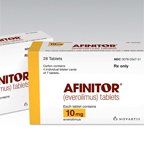ECC: Everolimus Effective in Advanced Papillary Renal Cell Carcinoma
The mTOR inhibitor everolimus showed clinical efficacy for the initial treatment of advanced papillary renal cell carcinoma, according to the phase II results of the RAPTOR trial.
The mTOR inhibitor everolimus showed clinical efficacy for the initial treatment of advanced papillary renal cell carcinoma, according to the phase II results of the RAPTOR trial.

The results of the trial were presented by Bernard Escudier, MD, chairman of the genitourinary tumor board at the Institut Gustave Roussy, Villejuif, France, at the 2013 European Cancer Congress (ECC).
“Our clinical findings are encouraging and suggest that everolimus may represent a new treatment option,” Escudier said.
In the open-label, phase II RAPTOR trial, Escudier and colleagues from six countries enrolled 92 treatment-naive patients with ECOG performance status of 1 or less. All patients were assigned to receive 10 mg everolimus once daily until disease progression or unacceptable toxicity. Central pathology review was performed for every patient.
Analysis of the results was done in three patients populations: safety (n = 92), intention-to-treat (n = 83), and per protocol (n = 63). Seventy-eight percent of the patients were men.
Looking at patients in the per protocol analysis, the 6-month progression-free survival was 58.7%; central review confirmed this in 34.9% of patients. Local review had a median progression-free survival of 7.8 months and central review had a median progression-free survival of 3.7 months. At least half of the patients were alive at 20 months.
“Similar results were seen in the intention-to-treat analysis and strongly confirm the overall study findings,” Escudier said. “According to assessments by the local investigators, progression-free survival was 7.6 months, according to the central review it was 3.7 months, and more than half of the patients were alive at 21 months. These results underline the differences that are often observed between local investigator assessment and central review according to the established set of rules used to evaluate anticancer drugs.”
Overall the drug was well tolerated. The most commonly occurring grade 3 or worse adverse events were asthenia (10.9%), fatigue (5.4%), and anemia (5.4%). Discontinuation due to adverse events occurred in 27.2% of patients.
According to the researchers, a phase III trial will help to full characterize the efficacy and safety profile of the drug in the population of patients with advanced papillary renal cell carcinoma.
“Treatment strategies for metastatic renal cell cancer have dramatically improved within the last few years. However, these achievements have been mostly restricted to patients with clear-cell- renal cell carcinoma,” Manuela Schmidinger, MD, professor of medicine in the department of oncology, University of Vienna, Austria, said in a press release. “RAPTOR is the first prospective study that investigated the impact of a targeted agent, everolimus, in patients with papillary renal cell carcinoma.”
Everolimus is currently approved for the treatment of patients with advanced renal cell carcinoma after failure of treatment with sunitinib or sorafenib.